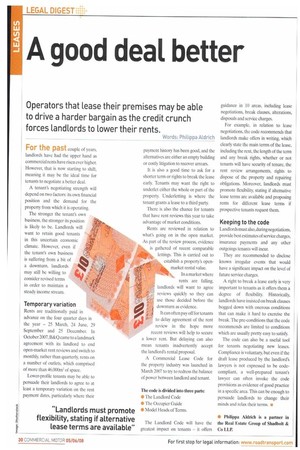A good deal better
Page 30

If you've noticed an error in this article please click here to report it so we can fix it.
Operators that lease their premises may be able to drive a harder bargain as the credit crunch forces landlords to lower their rents.
Words: Philippa Aldrich For the past couple of years, landlords have had the upper hand as commercial rents have risen ever higher. However, that is now starting to shift, meaning it may be the ideal time for tenants to negotiate a better deal.
A tenant's negotiating strength will depend on two factors: its own financial position and the demand for the property from which it is operating.
The stronger the tenant's own business, the stronger its position is likely to be. Landlords will want to retain good tenants in this uncertain economic climate. However, even if the tenant's own business is suffering from a bit of a downturn, landlords may still be willing to consider revised terms in order to maintain a steady income stream.
Temporary variation Rents are traditionally paid in advance on the four quarter days in the year — 25 March, 24 June, 29 September and 25 December. In October 2007, B&Q came to a landmark agreement with its landlord to end open-market rent reviews and switch to monthly. rather than quarterly, rents on a number of outlets, which comprised of more than 46,000m2 of space.
Lower-profile tenants may be able to persuade their landlords to agree to at least a temporary variation on the rent payment dates, particularly where their payment history has been good, and the alternatives are either an empty building or costly litigation to recover arrears.
It is also a good time to ask for a shorter term or rights to break the lease early. Tenants may want the right to underlet either the whole or part of the property. Underletting is where the tenant grants a lease to a third party.
There is also the chance for tenants that have rent reviews this year to take advantage of market conditions.
Rents are reviewed in relation to what's going on in the open market. As part of the review process, evidence is gathered of recent comparable lettings. This is carried out to establish a property's openmarket rental value.
Atts, In a market where rents are falling, landlords will want to agree reviews quickly so they can use those decided before the downturn as evidence.
It can often pay off for tenants to delay agreement of the rent review in the hope more recent reviews will help to secure a lower rent. But delaying can also mean tenants inadvertently accept the landlord's rental proposal.
A Commercial Lease Code for the property industry was launched in March 2007 to try to redress the balance of power between landlord and tenant. guidance in 10 areas, including lease negotiations, break clauses, alterations, disposals and service charges.
For example, in relation to lease negotiations, the code recommends that landlords make offers in writing, which clearly state the main terms of the lease, including the rent, the length of the term and any break rights, whether or not tenants will have security of tenure, the rent review arrangements, rights to dispose of the property and repairing obligations. Moreover, landlords must promote flexibility, stating if alternative lease terms are available and proposing rents for different lease terms if prospective tenants request them.
Keeping to the code Landlords must also, duringnegotiations, provide best estimates of service charges, insurance payments and any other outgoings tenants will incur.
They are recommended to disclose known irregular events that would have a significant impact on the level of future service charges.
A right to break a lease early is very important to tenants as it offers them a degree of flexibility. Historically, landlords have insisted on break clauses bogged down with onerous conditions that can make it hard to exercise the break. The pre-conditions that the code recommends are limited to conditions which are usually pretty easy to satisfy.
The code can also be a useful tool for tenants negotiating new leases. Compliance is voluntary, but even if the draft lease produced by the landlord's lawyers is not expressed to be codecompliant, a well-prepared tenant's lawyer can often invoke the code provisions as evidence of good practice in a specific area. This can be enough to persuade landlords to change their minds and relax their terms. u








































































































































































